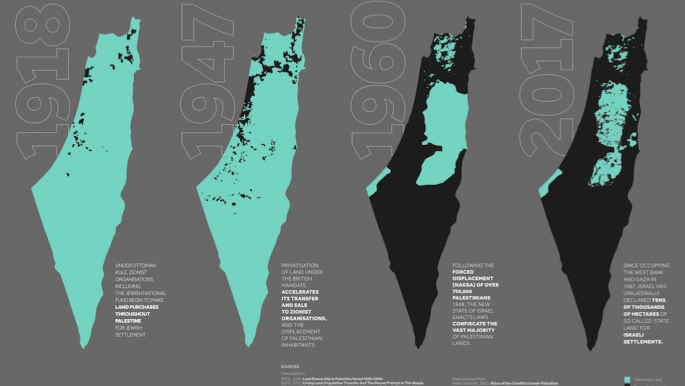
The road to Palestinian prosperity does not lead through Bahrain
But the US-Bahrain joint sponsorship of an economic "workshop" is trying to subvert this order. Trump's Middle East team insist they are not negating the political track, just delaying it. If that is the case - and however misguided - a much easier economic solution is possible.
To be clear, American ideas brewing in the minds of the president's son-in-law Jared Kushner, and senior advisor Jason Greenblatt, are not new.
Shortly after its military occupation of the West Bank and Gaza, Israel's defense minister Moshe Dayan initiated the "open bridges" strategy and applied a relatively hands-off policy towards Palestinians in the occupied Palestinian territories.
That worked for a while, but when Israel's illegal settlement activities began in Hebron, Palestinians rejected these efforts and the Israeli military occupiers had to flex their muscles even though they tried to spin the Palestinian situation as nothing more than a "benevolent" occupation.
That failed miserably, especially after the ascent of the right-wing pro-settlement Likud party in the late 1970s, and eventually this brought the Palestinian intifada which was met with Rabin's iron fist policy.
But even Rabin's direction changed after his own Damascus road experience that led to the Oslo Accords and the famous White House handshake. This process was set back when an Israeli assassinated Rabin.
Under Netanyahu's leadership, an economic peace was suggested in 2008, but failed to gain traction, leading us to the Kushner/Greenblatt Bahrain "prosperity for peace" summit.
 |
These are lofty ideas for an area under occupation and suffering from severe security restrictions. |  |
But next month's meeting about the Palestinian economy which was cooked up without consulting the Palestinian leadership, and that they have vowed to boycott, will have a hard time getting off the ground.
And if the US' priority is to bring "prosperity to Palestine", there are much easier and less expensive ways than the current Bahrain track.
A simple read of the plentiful studies carried out by the World Bank and other reputable organisations can provide us with a much better road map for Palestinian economic prosperity.
Jason Greenblatt regularly blames everything in Gaza on Hamas, in charge since June 2007, but doesn't even hint at what Israel could be doing to help.
 |
|
As top World Bank experts have repeatedly said, most of the economic problems facing Palestinians are connected to Israeli restrictions on the movement of people and goods within the occupied territories, and with the rest of the world.
A decision by the Israeli military establishment based in Tel Aviv to reduce the restrictions could easily produce a tangible and immediate improvement in the economy.
The Palestinian-Israel Declaration of Principles signed in the White House with the US as a witness, provides a clear solution. A safe passage between Gaza and the West Bank is enshrined in that agreement which Israel temporarily implemented, but then abandoned.
 |
A simple read of studies carried out by the World Bank provides a much better road map for Palestinian economic prosperity |  |
This passage could go a long way in relieving the economic stress in Gaza, and provide relief to the 1.8 million Palestinians who are living in this pressure cooker.
The 1999 safe passage protocol had plenty of security clauses to ensure Israeli security, but what the political will necessary for enforcing it was lacking.
The US-Bahrain statement about the 25 June workshop claimed that the aim is to support the "development of human capital, and facilitation of rapid private-sector growth". These are lofty ideas for an area under occupation and suffering from severe security restrictions.
The plan put forward by former Palestinian prime minister Salam Fayyad allows for exactly this kind of private sector growth, through.
He proposed infrastructural development including the urgent need of a port and airport to facilitate Palestinian exports to the nearby European markets.
Those plans as well as attempts by Palestinians to dig for oil in the West Bank, and for gas offshore Gaza have been rejected by Israel.
Read more: Arab hosts of Trump's 'peace summit' are throwing Palestinians under the bus
Palestinian telecommunication development has also been severely hammered by restrictions, as well. 3G was finally allowed (and only in the West Bank) after equipment nearly rusted in Israeli warehouses awaiting approval for entry.
4G is still not allowed to Palestinian companies in either Gaza or the West Bank, while Israeli companies are allowed to encroach on Palestinian airwaves and offer those very services denied to Palestinian telecommunication companies.
So rather than rolling out its blinkered economic plan to kickstart the Palestinian economy, which will anger the Palestinian leadership and push other countries to fork out a reported $68 billion, Trump's team could make a simple request to Israel: Remove the political barriers to engender a process that could pave the way for the political track.
Ultimately, a political solution is mandatory for ending the Israeli occupation, and for granting Palestinians their inalienable right to self-determination.
If this is not on the table now, a more modest proposal that includes a serious and verifiable plan for lifting Israeli economic restrictions, and honouring existing agreements - including the full transfer of monies earmarked for Palestine - could improve the atmosphere and prepare the way for an in-depth and serious political discussion.
Daoud Kuttab is an award-winning Palestinian journalist and former Ferris Professor of Journalism at Princeton University.
Follow him on Twitter: @daoudkuttab
Opinions expressed in this article remain those of the author and do not necessarily represent those of The New Arab, its editorial board or staff.





 Follow the Middle East's top stories in English at The New Arab on Google News
Follow the Middle East's top stories in English at The New Arab on Google News


